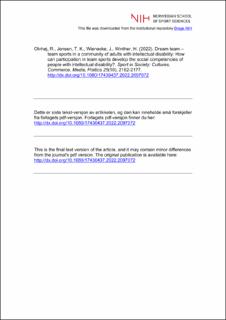| dc.contributor.author | Olvhøj, Rosita | |
| dc.contributor.author | Jensen, Tobias Knudgaard | |
| dc.contributor.author | Wienecke, Jacob | |
| dc.contributor.author | Winther, Helle | |
| dc.date.accessioned | 2024-01-24T08:40:10Z | |
| dc.date.available | 2024-01-24T08:40:10Z | |
| dc.date.created | 2022-08-30T11:26:12Z | |
| dc.date.issued | 2022 | |
| dc.identifier.citation | Sport in Society: Cultures, Commerce, Media, Politics. 2022, 25(10), 2162-2177. | en_US |
| dc.identifier.issn | 1743-0437 | |
| dc.identifier.uri | https://hdl.handle.net/11250/3113473 | |
| dc.description | I Brage finner du siste tekst-versjon av artikkelen, og den kan inneholde ubetydelige forskjeller fra forlagets pdf-versjon. Forlagets pdf-versjon finner du på tandfonline.com / In Brage you'll find the final text version of the tandfonline.com | en_US |
| dc.description.abstract | Participation in social communities is vital for all human beings. People with intellectual disability (ID) have fewer opportunities to engage and participate in social communities with peers and are therefore often exposed to loneliness and marginalization caused by social, psychological, and physical challenges. Previous studies describe how participation in team sports and other sports activities provides opportunities to build relationships, have influence, develop communication skills and thereby develop social competencies. Nevertheless, research enlightening how people with ID can develop social competencies through sports activities is very limited. This practice-oriented research project was conducted at a sports school, which offers daily sports and movement activities for adults with ID. The purpose of this study is to enlighten how participation in team sports at the school can develop social competencies in this target group. It was conducted through phenomenological and narrative inspired observations, which were analysed using theories about community, membership, bodily communication, and synchronization between individuals. The results show how team sport gives the students opportunities to experience membership in a social community, develop communication skills, and have synchronized experiences with others who have similar challenges. These experiences with synchronized energies, movements, and emotions, provide them with opportunities to experience valuable social moments with peers, which can form foundations for development. | en_US |
| dc.language.iso | eng | en_US |
| dc.subject | social competencies | en_US |
| dc.subject | membership | en_US |
| dc.subject | community | en_US |
| dc.subject | communication | en_US |
| dc.subject | movement | en_US |
| dc.subject | bodily communication | en_US |
| dc.subject | synchronization | en_US |
| dc.subject | intellectual disabilities | en_US |
| dc.title | Dream team – team sports in a community of adults with intellectual disability: How can participation in team sports develop the social competencies of people with intellectual disability? | en_US |
| dc.title.alternative | Dream team – team sports in a community of adults with intellectual disability : How can participation in team sports develop the social competencies of people with intellectual disability? | en_US |
| dc.type | Peer reviewed | en_US |
| dc.type | Journal article | en_US |
| dc.description.version | acceptedVersion | en_US |
| dc.source.pagenumber | 16 | en_US |
| dc.source.journal | Sport in Society: Cultures, Commerce, Media, Politics | en_US |
| dc.identifier.doi | 10.1080/17430437.2022.2097072 | |
| dc.identifier.cristin | 2047123 | |
| dc.description.localcode | Institutt for idrett og samfunnsvitenskap / Department of Sport and Social Sciences | en_US |
| cristin.ispublished | true | |
| cristin.fulltext | postprint | |
| cristin.qualitycode | 1 | |
